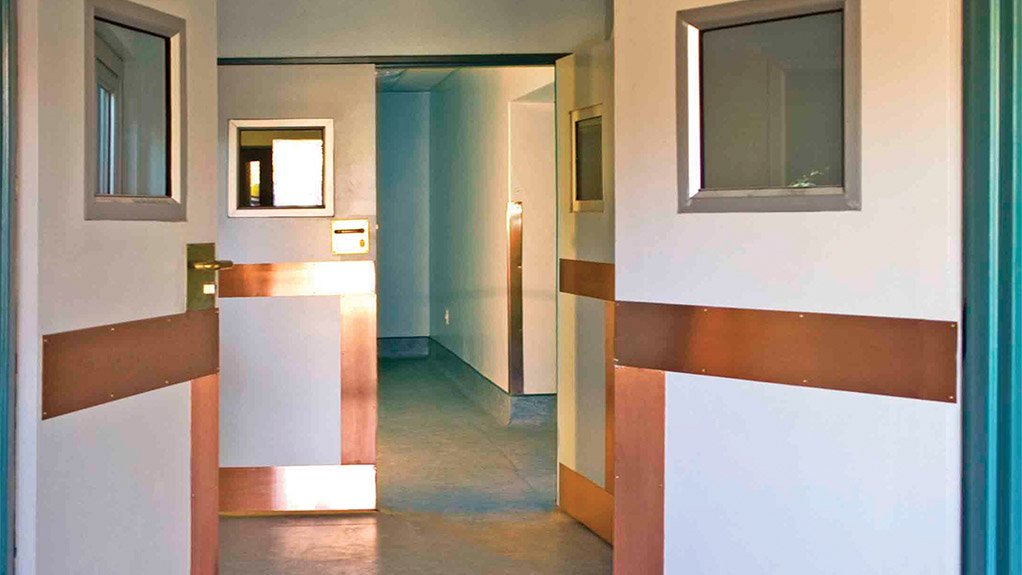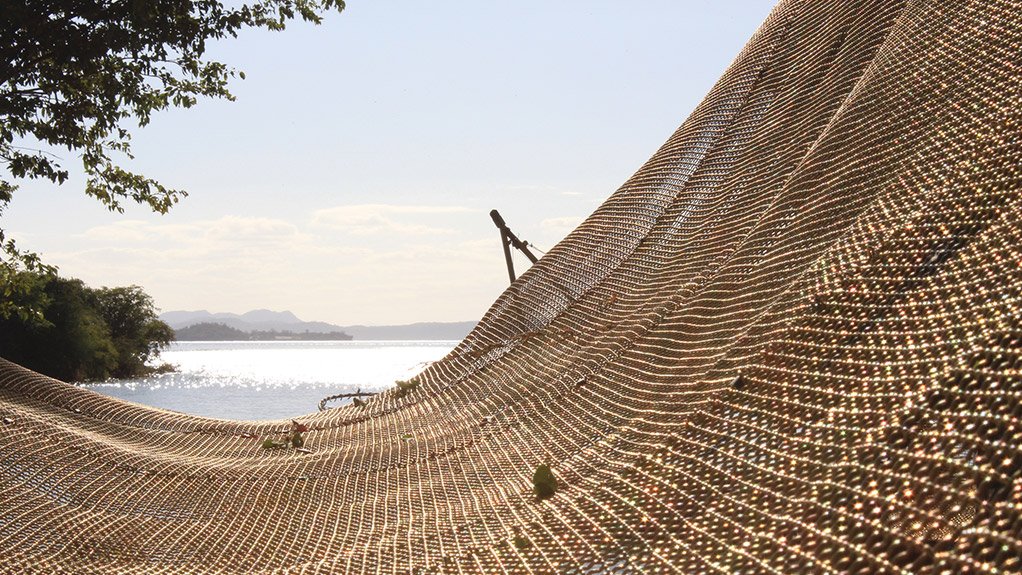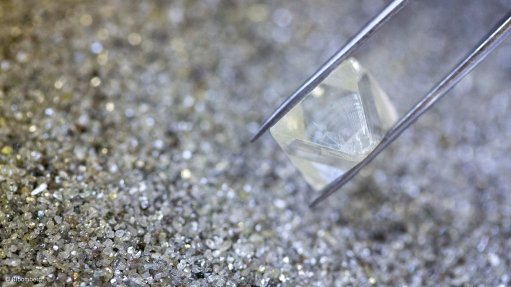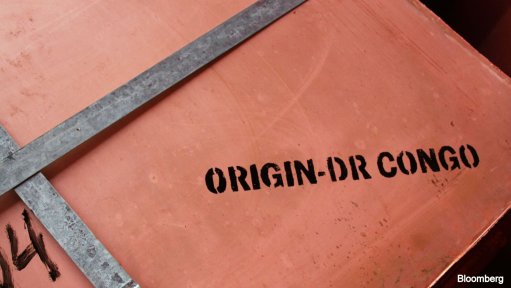Copper provides health, aquaculture benefits



COPPER TOUCH SURFACES During December 2014 and January 2015, 240 antimicrobial door handles were installed in Phelophepa I and II trains in total
COPPER FISH NETS Copper nets antimicrobial and algaecidal properties are anti befouling which results in healthier and larger fish
Pan African industry body Copper Development Association Africa (CDAA) is actively working to develop the downstream production of copper items, particularly in the healthcare sector, by highlighting the dangers of hospital-acquired infections in hospitals and clinics, says CDAA centre director Evert Swanepoel.
He highlights that thousands of patients die in hospitals every year as a result of infections contracted in healthcare facilities.
“These deaths can be avoided by installing antimicrobial copper touch surfaces in hospital wards, particularly in intensive care units,” states Swanepoel.
In 2014, the CDAA approached State-owned logistics company Transnet Foundation senior portfolio manager for health Shamona Kandia about installing antimicrobial copper touch surfaces to improve infection control measures on board the Transnet-Phelophepa healthcare trains.
These trains carry health professionals and vital medication together with
health education and knowledge to people who otherwise would never have the opportunity to see a health professional or receive ongoing treatment and life-saving preventative healthcare education.
This corporate social responsibility initiative of Transnet provides assistance for more than 300 000 people a year.
Swanepoel explains that an antimicrobial agent is one that kills microorganisms or inhibits their growth.
“Antimicrobial copper is any copper alloy with a copper content greater than 60%. There are more than 400 different alloys available on the market. Clinical trials locally and internationally, have shown that replacing frequently touched surfaces in a healthcare environment with antimicrobial copper helps to reduce microbial contamination by up to 80% depending on the amount of copper installed,” he says.
Swanepoel highlights that copper’s antimicrobial properties remain in effect for the product’s lifetime and do not rely on coatings or impregnated surfaces that can wear off or wash away.
During December 2014 and January 2015, 240 antimicrobial door handles were installed in Phelophepa I and II in total and, more installations are planned during the routine maintenance period starting in October and running until January 2016.
He says antimicrobial table tops will be installed and the stainless steel sliding doors currently in place in the kitchens will be replaced with those made of antimicrobial copper.
“There can be no doubt that the Phelophepa trains are impacting significantly on the health and wellbeing of the people in rural South Africa, with
further measures in place to prevent infection, the trains can continue their journey of hope with confidence,” Swanepoel enthuses.
Kandia adds that Phelophepa is about improving not just the health of individuals, but the health of entire communities and this initiative will result in a healthier and more productive South Africa.
HVAC Systems and Generators
Further, Swanepoel points out that airborne fungal spores can pose problems in buildings, not only in hospital environments where people are susceptible to invasive fungal infections but in any building where air-conditioning units are installed.
“Increasingly more time, estimated at over 90%, is spent in indoor environments in developed countries and may contribute to sick building syndrome.”
He says the use of aluminium fins within air-conditioning units offers no protection from the spread of fungal spores and may in fact increase their numbers.
Incorporating copper into heating, ventilating, and air conditioning, or HVAC, systems in place of aluminium offers the potential for a method of controlling fungal spore growth and survival and thus reduce the risk of infection and spread of fungal-related diseases.
Swanepoel comments that copper has the highest rated thermal and electrical conductivity.
“Generators with 100% copper windings provide ultimate reliability and performance. With load-shedding predicted to continue for at least two years, ensure your standby generator is engineered to perform at optimum,” he states.
Copper in Aquaculture
The CDAA states that the use of copper fish nets has significant advantages for fish farming.
The association says copper nets’ antimicrobial and algaecidal properties are antibiofouling, which results in healthier and larger fish. Copper holding nets also have strong structural properties, preventing damage from predators.
Global copper use advocate body the International Copper Association (ICA) notes that the Mozambezi tilapia fish farm near to the Cahora Bassa dam, in Mozambique, was using synthetic nets that were prone to biofouling.
High nutrient loading from rivers around Lake Kariba spill into the Cahora Bassa and the nutrients were clogging the farm’s nets containing tilapia.
“The biofouling of the synthetic nets resulted in low growth rates of the fish, disease and high mortalities, particularly when the tilapia were moved for net-cleaning procedures, which is a labour-intensive maintenance activity required weekly.”
The ICA states that biofouling also restricted the flow of water through the nets depriving the fish of oxygen and vital nutrients. This increased the possibility of disease and a reliance on antibiotics for the fish.
The synthetic nets were also prone to predator attacks by crocodiles, sharks and otters.
In 2010, the CDAA and Advance Africa, a company specialising in aquaculture, initiated copper net trials at the Mozambezi farm.
Following the launch, farm managers noted that the copper nets were not prone to biofouling or to predator attacks.
In May 2013, the copper nets were populated with 13 000 tilapia and by November that year the fish were harvested with favourable results.
At harvesting, the fish weighed on average 50 g, the fish were healthier and heavier than those harvested previously and the food conversion ratio (FCR) was better than the FCR of the fish in the adjoining synthetic nets.
The farm found that there was no need to remove or traumatise the fish to clean the nets, thereby resulting in lower operating costs and fewer fish mortalities. Additionally, during the growth trial period, crocodiles attacked the synthetic cage and caused major damage but the adjoining copper net was unmarked.
The copper nets were supplied by Germiston-based nonferrous metals manufacturer Copalcor.
Comments
Press Office
Announcements
What's On
Subscribe to improve your user experience...
Option 1 (equivalent of R125 a month):
Receive a weekly copy of Creamer Media's Engineering News & Mining Weekly magazine
(print copy for those in South Africa and e-magazine for those outside of South Africa)
Receive daily email newsletters
Access to full search results
Access archive of magazine back copies
Access to Projects in Progress
Access to ONE Research Report of your choice in PDF format
Option 2 (equivalent of R375 a month):
All benefits from Option 1
PLUS
Access to Creamer Media's Research Channel Africa for ALL Research Reports, in PDF format, on various industrial and mining sectors
including Electricity; Water; Energy Transition; Hydrogen; Roads, Rail and Ports; Coal; Gold; Platinum; Battery Metals; etc.
Already a subscriber?
Forgotten your password?
Receive weekly copy of Creamer Media's Engineering News & Mining Weekly magazine (print copy for those in South Africa and e-magazine for those outside of South Africa)
➕
Recieve daily email newsletters
➕
Access to full search results
➕
Access archive of magazine back copies
➕
Access to Projects in Progress
➕
Access to ONE Research Report of your choice in PDF format
RESEARCH CHANNEL AFRICA
R4500 (equivalent of R375 a month)
SUBSCRIBEAll benefits from Option 1
➕
Access to Creamer Media's Research Channel Africa for ALL Research Reports on various industrial and mining sectors, in PDF format, including on:
Electricity
➕
Water
➕
Energy Transition
➕
Hydrogen
➕
Roads, Rail and Ports
➕
Coal
➕
Gold
➕
Platinum
➕
Battery Metals
➕
etc.
Receive all benefits from Option 1 or Option 2 delivered to numerous people at your company
➕
Multiple User names and Passwords for simultaneous log-ins
➕
Intranet integration access to all in your organisation




















